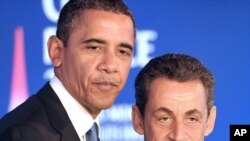Leaders of the world's leading economies are meeting in the French resort city of Cannes to discuss global economic problems, with the summit dominated by the European debt crisis and questions about a Greek bailout deal.
U.S. President Barack Obama met separately with German Chancellor Angela Merkel and French President Nicolas Sarkozy, who lead Europe's strongest economies, before Thursday's official start of the Group of 20 summit in Cannes.
President Obama said the European Union has taken some "important steps" to address its debt problems, and said he hopes the heads of the world's leading developed and developing countries can "flesh out" details of a comprehensive strategy to resolve the crisis.
U.S. officials said the summit would also follow up on last year's meeting and discuss issues including global economic growth and how to put people back to work in countries with high unemployment.
In an emergency meeting of European leaders ahead of the G20 summit, President Sarkozy and Chancellor Merkel said Wednesday that Greece would not receive "one more cent" of rescue loans from the EU or the IMF unless it abides by the terms of the economic bailout package reached last week.
"We very clearly say that the sixth tranche can only be paid when Greece has accepted all parts of the decision of October 27th, and additionally, every doubt concerning the result of the announced referendum has been dispelled," said Merkel.
Greek Prime Minister Papandreou surprised other European leaders this week by announcing that he would put the latest international rescue plan to a referendum vote of Greeks, with whom the plan's austerity measures are unpopular.
The wording of the proposed referendum is not clear, but Papandreou said Wednesday that Greece's future participation in Europe's common currency was at stake in the vote.
"We need to have a wide consensus because the program we are facing is difficult, is difficult in implementation but I believe the Greek people want us to be a strong partner in the euro, in the eurozone and a strong partner in Europe," said Papandreou."And that is at stake."
On Thursday, Greek Finance Minister Evangelos Venizelos broke ranks with Papandreou and spoke out against the referendum. Venizelos said Greece's status in the eurozone cannot be made dependent on a popular vote.
President Sarkozy said that he hopes Greece would remain in the eurozone, but stressed that the stability of the euro was of greater importance than rescuing the Greek economy.
The bailout agreement reached last week would forgive $140 billion in money owed by Greece to private banks and strengthen a European bailout fund for Greece and other countries with troubled economies. It had been been hailed as a crucial breakthrough in the efforts to solve the two-year-old European sovereign debt crisis.




